Thailand has it's pad thai and fried insects, Australia has it's kangaroo steaks, but Peru has something even more delicious: roasted guinea pig.
We made a couple of friends in Australia that we've bumped into around the world (they're called Alex and Ruth and they have a website too), so when we met them again in Cusco, we made a pact that we wouldn't leave until we'd eaten guinea pig (or 'cuy' as they call it here).
We've never been confronted by such a terrifying meal. I'm still suspicious whether it actually was a guinea pig - it was HUGE and overhung our plate. Probably a rat. It didn't have much meat on it or taste for that matter, but the tiny scrapings we ate were horrible and pink, like turkey leg dipped in death. Some of the beast's innards were intact, including the kidneys, and any gaps were filled with rancid stuffing.
Amy did a stirling job of getting through our rodent, while I pulled it's dead head into different expressions (depsite it being roasted, it was still possible to make the thing blink and waggle it's tongue). For some reason, me playing with the creature's severed head put Alex and Ruth off their guinea pig, the wimps.
I once told a Bolivian friend we made in La Paz that in the UK, we keep guinea pigs as pets and would never think of eating them. "But why, when they're so tasty?" he replied.
It's unlikely that we'll ever try guinea pig again, though I'd still rather have a second helping of it, than try Peru's other famous dish: ceviche - basically raw fish, with a bit of lemon. Food poisoning, anyone?
ads
Thursday 23 June 2005
Tuesday 21 June 2005
Lake Titicaca and the million dollar bra
See our Lake Titicaca pictures. (30 in total over two pages, including Amy on a horse, 10 children in traditional dress, two silly hats, kittens, llamas and one angry bird).
We'd heard bad things about the Bolivia / Peru border at Desaguadero. Border officials stealing money from tourists; planting drugs in their bags and then threatening them with prison unless they cough up a hefty bribe - you know, the usual.
We'd also heard that the border officials were wise to tourists stowing money in money belts and boots, so we had to stash our cash in a place they'd never look: Amy's bra. She had about $400 dollars rammed in there and she couldn't have looked better.
As it turned out, we passed into Peru and reached our destination of Puno (which I can confirm for Amy's dad, who'd been reading the Home Office website, is crammed with rabid dogs) without any problems at all. From here we spent a couple of days on Lake Titicaca, which was great fun despite the efforts of probably the world's worst guide trying his hardest to ruin it for us.
I won't go into details, so you can look at our Lake Titicaca photos instead (warning: contains a picture of us in silly clothes).
We're now in Cusco, "the naval of the Inca World" as all guidebooks remind us. There's an incredible number of tourists here - everyone's either waiting to see Machu Picchu, or are on their way back from doing it. We can't walk down the street without being chased by a crowd of touts trying to bribe us into their bar, restaurant, or get us to book the bloody Inca Trail with them.
To everyone here, we look like like big, walking wallets (apart from the shoe shine boys, who think we look like big, dirty boots.)
We're being scrooges and boycotting the four-day Inca Trail. It's too expensive and quite frankly, we're lazy and would rather catch the train. We did shell out $60 each today though, for seats at Inti Raymi (more info). It's the annual Inca festival of the sun and features lots of funny costumes and dancing, culminating with the sacrifice of a llama. It's on Friday. We can't wait.
We'd heard bad things about the Bolivia / Peru border at Desaguadero. Border officials stealing money from tourists; planting drugs in their bags and then threatening them with prison unless they cough up a hefty bribe - you know, the usual.
We'd also heard that the border officials were wise to tourists stowing money in money belts and boots, so we had to stash our cash in a place they'd never look: Amy's bra. She had about $400 dollars rammed in there and she couldn't have looked better.
As it turned out, we passed into Peru and reached our destination of Puno (which I can confirm for Amy's dad, who'd been reading the Home Office website, is crammed with rabid dogs) without any problems at all. From here we spent a couple of days on Lake Titicaca, which was great fun despite the efforts of probably the world's worst guide trying his hardest to ruin it for us.
I won't go into details, so you can look at our Lake Titicaca photos instead (warning: contains a picture of us in silly clothes).
We're now in Cusco, "the naval of the Inca World" as all guidebooks remind us. There's an incredible number of tourists here - everyone's either waiting to see Machu Picchu, or are on their way back from doing it. We can't walk down the street without being chased by a crowd of touts trying to bribe us into their bar, restaurant, or get us to book the bloody Inca Trail with them.
To everyone here, we look like like big, walking wallets (apart from the shoe shine boys, who think we look like big, dirty boots.)
We're being scrooges and boycotting the four-day Inca Trail. It's too expensive and quite frankly, we're lazy and would rather catch the train. We did shell out $60 each today though, for seats at Inti Raymi (more info). It's the annual Inca festival of the sun and features lots of funny costumes and dancing, culminating with the sacrifice of a llama. It's on Friday. We can't wait.
Saturday 18 June 2005
I'll teach you a thing or two
Now that we're safely in Peru, far away from the problems of La Paz and the past few weeks - I think it's safe to reminisce a bit about our time as teachers. Living out our daily lives in Sucre, being settled and not feeling like 'travellers' for a while has been the best bit of South America for me (so far). 61 days in Bolivia and I wouldn't have it any other way. Welcome to the weird and wonderful world of TEFL teaching....
Despite originally being given 'the worst class in the school' (to quote one teacher), my overall feelings on teaching were that while challenging, I was actually helping people improve their lives. It was like suddenly turning into Jamie Oliver at a cooking convention. We were the most popular people in the school for a time, even 'teaching the teachers' in a weekly session. The best job satisfaction!
And yes, my original class weren't exactly a joy to teach. They were riotous 10-year-olds who'd much rather run in the playground than have another hour at school. But the lessons sometimes brought unexpected fun like trying to explain the meanings of computer-related titles when I was asked, such as 'Medal of Honour' and 'Power-Point'. Although I had to feign innocence when one of the boys piped up, "what does Vice City mean?"!
For a more challenging teaching experience, I swapped the little terrors for a class of older students who had a lesser grasp of English. In fact, it may have been a godsend that I was actually sent to help them as their normal English teacher was stuggling with the language herself. She later admitted to me that she hadn't actually used her English in about 20 years which was why she was a bit rusty. In this class, we got down to some proper work even with simple things such as distinguishing the meaning and pronounciation between words (such as 'yes', 'chess' and 'cheese' on one occasion).
But it didn't stop there. We also helped in a language exchange most of the week and had that mad weekend where we managed to work day and night to make them that website *another plug*. All in all, we were busier than at home! We just wanted to get stuck in and help as much as possible in the time we had.
Our final day was marked with a promise of a trip to the local karoke bar. We had been a bit concerned about the prospect of singing (in español) but the teachers seemed so keen we didn't want to disapoint. As they led us down the street, I was trying to find out if they had any songs in English and didn't even notice that they were taking us in the wrong direction and into our favourite steak restaurant... It was such a brilliant evening. We were lost for words that this elabrorate ruse was to thank us for all our hard work. We were presented with so many gifts - flowers, matching fleeces, cards, that we almost decided we didn't want to leave afterall. Even now, we often chat about our time there and plot when we can go back...
Where are we? Just arrived in Cusco - the home of Machu Picchu (very exciting). We'll probably be staying about two weeks which is about enough time to visit the many Inca ruins plus enjoy the big winter solstice festival of Inti Raymi on June 24.
Despite originally being given 'the worst class in the school' (to quote one teacher), my overall feelings on teaching were that while challenging, I was actually helping people improve their lives. It was like suddenly turning into Jamie Oliver at a cooking convention. We were the most popular people in the school for a time, even 'teaching the teachers' in a weekly session. The best job satisfaction!
And yes, my original class weren't exactly a joy to teach. They were riotous 10-year-olds who'd much rather run in the playground than have another hour at school. But the lessons sometimes brought unexpected fun like trying to explain the meanings of computer-related titles when I was asked, such as 'Medal of Honour' and 'Power-Point'. Although I had to feign innocence when one of the boys piped up, "what does Vice City mean?"!
For a more challenging teaching experience, I swapped the little terrors for a class of older students who had a lesser grasp of English. In fact, it may have been a godsend that I was actually sent to help them as their normal English teacher was stuggling with the language herself. She later admitted to me that she hadn't actually used her English in about 20 years which was why she was a bit rusty. In this class, we got down to some proper work even with simple things such as distinguishing the meaning and pronounciation between words (such as 'yes', 'chess' and 'cheese' on one occasion).
But it didn't stop there. We also helped in a language exchange most of the week and had that mad weekend where we managed to work day and night to make them that website *another plug*. All in all, we were busier than at home! We just wanted to get stuck in and help as much as possible in the time we had.
Our final day was marked with a promise of a trip to the local karoke bar. We had been a bit concerned about the prospect of singing (in español) but the teachers seemed so keen we didn't want to disapoint. As they led us down the street, I was trying to find out if they had any songs in English and didn't even notice that they were taking us in the wrong direction and into our favourite steak restaurant... It was such a brilliant evening. We were lost for words that this elabrorate ruse was to thank us for all our hard work. We were presented with so many gifts - flowers, matching fleeces, cards, that we almost decided we didn't want to leave afterall. Even now, we often chat about our time there and plot when we can go back...
Where are we? Just arrived in Cusco - the home of Machu Picchu (very exciting). We'll probably be staying about two weeks which is about enough time to visit the many Inca ruins plus enjoy the big winter solstice festival of Inti Raymi on June 24.
Saturday 11 June 2005
Leaving La Paz
La Paz appears to be back to normal again. The streets are rammed with markets, bus loads of tourists are arriving and you can't cross the road for fear of being run over.
New people checked into our hotel (El Solario) for the first time all week and men are working to repair the ripped up cobble-stone roads (a few days ago, protesters dug them up and piled the bricks for blockades). Hell, it was even warm and sunny today.
Now that the petrol stations are open again there are huge queues for fuel, so bus services aren't back to normal yet. This means that we're stuck here until Monday, before we head to Copacabana.
Although at times things were tense and terrifying, I'm glad that we were here when La Paz was on the brink of civil war. I couldn't imagine a friendlier war zone than Bolivia! It shows the true colours of the people here, that even when they're fleeing tear gas rockets, they still have time to apologise for the mess the streets are in and ask if we need help getting back to our hotel.
We befriended a lot of people here during the trouble, such as shop owners and one person I'm particularly impressed with being on first name terms with - a witch from the witches market (you can see a photo of her here). I'm sure if we run into any other problems in South America, she can help us out by rustling up a plague of locusts, or something.
It's great to see that locals are able to earn a living again. And the sight last week of kids playing football on a street that today is once again choked with traffic, will stay with me for a long time.
From now on, we'll resume normal frequency of blog posts (one every few days), because no one wants to hear about La Paz living up to it's name (in English: 'The Peace').
New people checked into our hotel (El Solario) for the first time all week and men are working to repair the ripped up cobble-stone roads (a few days ago, protesters dug them up and piled the bricks for blockades). Hell, it was even warm and sunny today.
Now that the petrol stations are open again there are huge queues for fuel, so bus services aren't back to normal yet. This means that we're stuck here until Monday, before we head to Copacabana.
Although at times things were tense and terrifying, I'm glad that we were here when La Paz was on the brink of civil war. I couldn't imagine a friendlier war zone than Bolivia! It shows the true colours of the people here, that even when they're fleeing tear gas rockets, they still have time to apologise for the mess the streets are in and ask if we need help getting back to our hotel.
We befriended a lot of people here during the trouble, such as shop owners and one person I'm particularly impressed with being on first name terms with - a witch from the witches market (you can see a photo of her here). I'm sure if we run into any other problems in South America, she can help us out by rustling up a plague of locusts, or something.
It's great to see that locals are able to earn a living again. And the sight last week of kids playing football on a street that today is once again choked with traffic, will stay with me for a long time.
From now on, we'll resume normal frequency of blog posts (one every few days), because no one wants to hear about La Paz living up to it's name (in English: 'The Peace').
Friday 10 June 2005
What a difference a day makes
Potosi is a mining city in southern Bolivia that's full of poor miners who pointlessly dig away inside dangerous caves to try and scrape themselves a scrap of tin. Miners have made up a large number of the protesters since the demonstrations began. Dressed in tin hats that make them resemble World War One vets, they intimidate police and egg on the other demonstrators by throwing dynamite around.
Some traveller knobs revel in it. One told us: "I heard that there were riots in La Paz and I flew right here!" And now you're stuck here you twat, laying in bed at night, hoping that the objects that land on your roof are rocks and not dynamite.
Yesterday police shot dead a miner outside Sucre - surprisingly the first fatality since the protests started a month ago. We awoke this morning to the boom of more dynamite blasts than we'd ever heard before. Miners had flocked in their hundreds to La Paz, but not to fight police. We headed down to the main avenue to see what all the fuss was about (as you do, when you hear TNT going off) and watched as a coffin was carried by a group of miners, flanked by others throwing dynamite on the road as a kind of TNT salute to the deceased.
There has been no violence in the city today and after the head of Bolivia's Supreme Court was appointed president last night (see news story), it seems that the city is slowly returning to normal. Blockades are being cleared, some cars are back on the roads and police are performing routine street patrols again (previously, most of the city was lawless).
For the first time in weeks it's possible to take a cab to the airport in daylight without it getting stoned. We've heard mixed messages from people here, but the word is that petrol is finally making it's way to the airport and flights will resume again shortly.
We've been denied seats on the flight to Cusco tomorrow, but because bus services are rumoured to run again from Sunday, we'll find out tomorrow if we're instead busing it out of here. It'll save us a lot of money and we'll be able to get to Copacabana - the access point for Lake Titicaca.
It's crazy what a difference a day makes. I don't even understand why people have toned down their protests - there's still no chance of gas nationalisation, but perhaps the protesters are pacified by the prospect of a general election (more power to the people, I suppose).
Although we've had a crazy week here - and I don't want to speak too soon, because we haven't left yet - I'm glad that we rode it out. (Exciting traveller boast no.23: "While in Bolivia, we got tear-gassed! It burnt our eyes and throats and was super.").
It's also proved what a fat lot of good foreign embassies are. The US Embassy was so terrified earlier in the week that most of their staff fled back to the States, the bunch of wimps (as this story reports). What about the poor American tourists stuck here?
Taking the protests very seriously, Israel chartered some kind of chicken plane to get their tourists out of La Paz on Wednesday (see story). Military service is compulsory in Israel, so why their government is worried about a crowd of trained killers being in danger when the rocks start to fly, I have no idea.
And how about the British Embassy? Well, we emailed them the other day and their advice was thus: "It would be sensible for those that have not already done so, to have a reserve of tinned food." How very English. Every year at Christmas, the people in my mum's village panic-buy food, knowing that the local shop will be closed for two days. So I suppose the prospect of no more food entering La Paz, ever, is cause enough to get the sardines in. Cheers British Embassy. You may have saved our lives.
Some traveller knobs revel in it. One told us: "I heard that there were riots in La Paz and I flew right here!" And now you're stuck here you twat, laying in bed at night, hoping that the objects that land on your roof are rocks and not dynamite.
Yesterday police shot dead a miner outside Sucre - surprisingly the first fatality since the protests started a month ago. We awoke this morning to the boom of more dynamite blasts than we'd ever heard before. Miners had flocked in their hundreds to La Paz, but not to fight police. We headed down to the main avenue to see what all the fuss was about (as you do, when you hear TNT going off) and watched as a coffin was carried by a group of miners, flanked by others throwing dynamite on the road as a kind of TNT salute to the deceased.
There has been no violence in the city today and after the head of Bolivia's Supreme Court was appointed president last night (see news story), it seems that the city is slowly returning to normal. Blockades are being cleared, some cars are back on the roads and police are performing routine street patrols again (previously, most of the city was lawless).
For the first time in weeks it's possible to take a cab to the airport in daylight without it getting stoned. We've heard mixed messages from people here, but the word is that petrol is finally making it's way to the airport and flights will resume again shortly.
We've been denied seats on the flight to Cusco tomorrow, but because bus services are rumoured to run again from Sunday, we'll find out tomorrow if we're instead busing it out of here. It'll save us a lot of money and we'll be able to get to Copacabana - the access point for Lake Titicaca.
It's crazy what a difference a day makes. I don't even understand why people have toned down their protests - there's still no chance of gas nationalisation, but perhaps the protesters are pacified by the prospect of a general election (more power to the people, I suppose).
Although we've had a crazy week here - and I don't want to speak too soon, because we haven't left yet - I'm glad that we rode it out. (Exciting traveller boast no.23: "While in Bolivia, we got tear-gassed! It burnt our eyes and throats and was super.").
It's also proved what a fat lot of good foreign embassies are. The US Embassy was so terrified earlier in the week that most of their staff fled back to the States, the bunch of wimps (as this story reports). What about the poor American tourists stuck here?
Taking the protests very seriously, Israel chartered some kind of chicken plane to get their tourists out of La Paz on Wednesday (see story). Military service is compulsory in Israel, so why their government is worried about a crowd of trained killers being in danger when the rocks start to fly, I have no idea.
And how about the British Embassy? Well, we emailed them the other day and their advice was thus: "It would be sensible for those that have not already done so, to have a reserve of tinned food." How very English. Every year at Christmas, the people in my mum's village panic-buy food, knowing that the local shop will be closed for two days. So I suppose the prospect of no more food entering La Paz, ever, is cause enough to get the sardines in. Cheers British Embassy. You may have saved our lives.
Thursday 9 June 2005
Another day in paradise
After the quiet that was yesterday, we all had our fingers crossed that maybe it was... over?
Some people in our hostel have this crazy idea that it's fun to be stuck in this situation. If someone was paying me, fair enough. If I was working, fair enough. But as a bystander, no thankyou. I'm supposed to be on holiday, not trying to dodge tear gas!
The dynamite explosions to rally the protesters started up again before midday with more intensity and ferocity than before, so we had no choice but to hole up in our hostel. With nothing else to do, I decided to pass some time online. This was fine until all the computers, hovers etc. in our hostel were suddenly cut off, sparking a panic of a city-wide power cut - something that the protesters had been threatening since all the trouble began. After half an hour of thinking we'd have to start living on chocolate and bananas, we got a report from a fellow guest that it was just our block that had no power. Relief all round and we celebrated with a game of cards.
To be honest, I'm still clinging to the vague hope we can leave on Saturday (the agency still haven't confirmed our flight) or that the British Embassy will rescue us if it gets any worse.
From what we've seen in the centre and gringo district, the atmosphere is a lot calmer than it was on Tuesday. We haven't smelt a whiff of tear gas and while many people are congregating in the squares, we haven't seen any marches outside the square, violence or further ripping up of the roads.
While we see some taxis and buses trying to drum up business in the early mornings, the rest of the day the streets are free of cars because of fear that they might get stoned. Even the taxi that brought us from the airport had a big crack across his windscreen after he was ambushed.
Protesters are making speeches along the main avenue but there seems to be a lot less people gathering there than earlier this week. Police presence is concentrated to government buildings and the main squares, and appears minimal elsewhere. Police aren't very popular at the moment so they're trying to stick together.
In Sucre, Congress are meeting today to decide the fate of President Mesa - is he allowed to resign or not? Not that any of this matters to the protesters, getting Mesa out of office doesn't help their cause. It's just a temporary distraction for the government.
Other news: the only time I ventured out today, I had some horrible squat Bolivian man say something rude and blow me a kiss. Urgh! The funny thing is, it's so cold here that I reckon he could only see from my eyebrows to my nose - I'm so wrapped up!
Some people in our hostel have this crazy idea that it's fun to be stuck in this situation. If someone was paying me, fair enough. If I was working, fair enough. But as a bystander, no thankyou. I'm supposed to be on holiday, not trying to dodge tear gas!
The dynamite explosions to rally the protesters started up again before midday with more intensity and ferocity than before, so we had no choice but to hole up in our hostel. With nothing else to do, I decided to pass some time online. This was fine until all the computers, hovers etc. in our hostel were suddenly cut off, sparking a panic of a city-wide power cut - something that the protesters had been threatening since all the trouble began. After half an hour of thinking we'd have to start living on chocolate and bananas, we got a report from a fellow guest that it was just our block that had no power. Relief all round and we celebrated with a game of cards.
To be honest, I'm still clinging to the vague hope we can leave on Saturday (the agency still haven't confirmed our flight) or that the British Embassy will rescue us if it gets any worse.
From what we've seen in the centre and gringo district, the atmosphere is a lot calmer than it was on Tuesday. We haven't smelt a whiff of tear gas and while many people are congregating in the squares, we haven't seen any marches outside the square, violence or further ripping up of the roads.
While we see some taxis and buses trying to drum up business in the early mornings, the rest of the day the streets are free of cars because of fear that they might get stoned. Even the taxi that brought us from the airport had a big crack across his windscreen after he was ambushed.
Protesters are making speeches along the main avenue but there seems to be a lot less people gathering there than earlier this week. Police presence is concentrated to government buildings and the main squares, and appears minimal elsewhere. Police aren't very popular at the moment so they're trying to stick together.
In Sucre, Congress are meeting today to decide the fate of President Mesa - is he allowed to resign or not? Not that any of this matters to the protesters, getting Mesa out of office doesn't help their cause. It's just a temporary distraction for the government.
Other news: the only time I ventured out today, I had some horrible squat Bolivian man say something rude and blow me a kiss. Urgh! The funny thing is, it's so cold here that I reckon he could only see from my eyebrows to my nose - I'm so wrapped up!
Wednesday 8 June 2005
All's quiet in La Paz
If you want to beat the protestors you have to get up early in the morning. That's because most of them have a long walk from El Alto - the poor suburb that's far away from the city centre and stretches up into the mountains.
So today we were at the post office at 9am, shipping yet another box of woolen products to the UK. Getting Amy out of bed at that time is a war in itself, but we made it.
We saw a few cars making their way through the streets, undisturbed, (yesterday, they would have been stoned) and market stalls were opening. By midday, protesters had gathered on the main avenue, but compared to yesterday's bedlam, all is calm.
This afternoon we discovered shops on our street that previously hid behind wooden boards. We haven't smelt so much as a whiff of tear gas all day. Many market stalls are still closed, but it's an improvement.
It's currently 4pm and there's not a hint of tension in the air. At this time yesterday we were cowering in a shop the size of a shoebox with eight Bolivian people, watching the tear gas fly from our window.
In fact, the most dangerous thing I experienced today was a chicken empanada I bought off the side of the road (after biting the top off, I tipped about a pint of grease out of it before admitting defeat).
Another serious danger is that the longer we stay here, the more crap we end up buying. "Look Amy, that rug's nice," ten minutes later turned into: "Ok, we'll take it!"
Certain foods are becoming so sparse that the burger I ate for lunch appeared to have been sliced down the middle, so that the other half could be sold to another customer. We've stocked up with enough water, snacks and booze to last us until we (hopefully) fly on Saturday. Our seats on the flight will be confirmed or denied tomorrow.
So today we were at the post office at 9am, shipping yet another box of woolen products to the UK. Getting Amy out of bed at that time is a war in itself, but we made it.
We saw a few cars making their way through the streets, undisturbed, (yesterday, they would have been stoned) and market stalls were opening. By midday, protesters had gathered on the main avenue, but compared to yesterday's bedlam, all is calm.
This afternoon we discovered shops on our street that previously hid behind wooden boards. We haven't smelt so much as a whiff of tear gas all day. Many market stalls are still closed, but it's an improvement.
It's currently 4pm and there's not a hint of tension in the air. At this time yesterday we were cowering in a shop the size of a shoebox with eight Bolivian people, watching the tear gas fly from our window.
In fact, the most dangerous thing I experienced today was a chicken empanada I bought off the side of the road (after biting the top off, I tipped about a pint of grease out of it before admitting defeat).
Another serious danger is that the longer we stay here, the more crap we end up buying. "Look Amy, that rug's nice," ten minutes later turned into: "Ok, we'll take it!"
Certain foods are becoming so sparse that the burger I ate for lunch appeared to have been sliced down the middle, so that the other half could be sold to another customer. We've stocked up with enough water, snacks and booze to last us until we (hopefully) fly on Saturday. Our seats on the flight will be confirmed or denied tomorrow.
Tuesday 7 June 2005
Sin gas, por favor
The protests over gas in La Paz have probably hit mainstream news in the UK now, with the President's offer of resignation last night. So we thought we'd start regular updates on the blog to let you know that we're fine.
The protests have taken over the city centre and have fallen into the routine of starting in the main square each morning, before police drive the protestors up to higher ground each afternoon.
The majority of protestors act peacefully, but gather in such overwhelming numbers that the police disperse them with tear gas. (By the way, the affects of tear gas are unpleasant, but not serious. Both Amy and I have been caught in a few clouds of the stuff now and it burns the nostrils, eyes and throat but wears off the minute you get to fresh air. There's more tear gas info on How Stuff Works.com).
We've been grateful for the kindness of the public here. Earlier today we were walking to a flight office and were caught in a crowd fleeing the square to escape the police. Protesters stopped to ask if we were ok, offering us boiled sweets (if needed, they apparently suppress the affects of the gas) and advised us on the best way to get back to our hotel.
Today, shop owners asked if we'd like to shelter in their buildings in case there was more gas released. The police appear to only be armed with tear gas and batons, and no serious injuries have been reported since the protests began weeks ago.
The demonstrations are destroying business in the city. The black market was bustling when we were here last month, but today only a few stalls were open. One hotel receptionist told us that only two tourists were staying at her four-storey hotel. There are no cars on the streets and people play football on the normally-congested main avenue. Restaurants are running out of food and a Bolivian friend we've made told us that the price of eggs in his neighbourhood has risen from 0.20 Boliviano's to 2 Boliviano's.
We're hoping to fly to Peru on Thursday, but many of the airlines are suffering from a fuel shortage because protestors have built blockades on all of the city's access roads. If not, we'll fly on Saturday with LAB airlines, who don't appear to have been affected by the shortage. Who knows - perhaps everything will be back to normal by then. More tomorrow.
The protests have taken over the city centre and have fallen into the routine of starting in the main square each morning, before police drive the protestors up to higher ground each afternoon.
The majority of protestors act peacefully, but gather in such overwhelming numbers that the police disperse them with tear gas. (By the way, the affects of tear gas are unpleasant, but not serious. Both Amy and I have been caught in a few clouds of the stuff now and it burns the nostrils, eyes and throat but wears off the minute you get to fresh air. There's more tear gas info on How Stuff Works.com).
We've been grateful for the kindness of the public here. Earlier today we were walking to a flight office and were caught in a crowd fleeing the square to escape the police. Protesters stopped to ask if we were ok, offering us boiled sweets (if needed, they apparently suppress the affects of the gas) and advised us on the best way to get back to our hotel.
Today, shop owners asked if we'd like to shelter in their buildings in case there was more gas released. The police appear to only be armed with tear gas and batons, and no serious injuries have been reported since the protests began weeks ago.
The demonstrations are destroying business in the city. The black market was bustling when we were here last month, but today only a few stalls were open. One hotel receptionist told us that only two tourists were staying at her four-storey hotel. There are no cars on the streets and people play football on the normally-congested main avenue. Restaurants are running out of food and a Bolivian friend we've made told us that the price of eggs in his neighbourhood has risen from 0.20 Boliviano's to 2 Boliviano's.
We're hoping to fly to Peru on Thursday, but many of the airlines are suffering from a fuel shortage because protestors have built blockades on all of the city's access roads. If not, we'll fly on Saturday with LAB airlines, who don't appear to have been affected by the shortage. Who knows - perhaps everything will be back to normal by then. More tomorrow.
Thursday 2 June 2005
Goodbye sunshine, hello tear gas
See our Sucre pictures
We've fallen into a way of life in Sucre, having spent over a month here. We buy grapefruit juice off the guy in the square and homemade biscuits from the woman with crazy teeth in the Plaza. We take Spanish lessons in the morning, teach English in the evenings and spend nights drinking Havana Club rum with our friends in the hotel. So why the hell we're leaving this sunny paradise for cold, dirty La Paz I've no idea, but we can't stay here forever. Peru beckons and La Paz is the logical stepping stone. Besides, all of our friends have left Sucre now and one of the TV channels has started a Jean-Claude Van Damme season, so we think it's a sign to make a move.
Here's some of the things we'll remember about Sucre:
Teaching English: I've been teaching a class who are mostly around 15 years old, alongside their usual teacher, Delia. Last night was my final class with them and due to an unexpected phonecall from the airline, I didn't get to the class untill it was almost over. I arrived to find that they'd prepared a goodbye party, with pizza, coke and presents. The pizza was cold and everyone had started eating, thinking that I wasn't going to turn up. I felt terrible for being late, but really appreciated the surprise. Fox - the language school - prepared a great send-off for us, but Amy's going to write about that some other time.
In a class a couple of weeks ago, I introduced the term 'used to' to the students. During a discussion about music, I asked them to put it into practice. The conversation turned to Michael Jackson. "I used to like Michael Jackson's music, but not any more," one student said. "Very good," I replied. "Can anyone else add to that?"
Another student piped up and said without any humour: "Michael Jackson used to be black, but now he's white." "That's right. Michaeal Jackson used to be black, but now he's white," I repeated out of protocol.
Watching a Bolivian football match: Bolivia is football crazy and I was expecting a roaring mass of people to be gathered in Sucre's stadium to watch two of the countries top teams battle it out. The reality was a near-empty stadium, mostly made up of kids offering to shine shoes and women flogging peanuts, watching a bunch of amateurs limp around an unkept pitch. The grass was so long in places that I was surprised that they didn't lose the ball.
The world's largest dinosaur footprint site: Wooo hooo! Dino footprints! The site is in a cement factory, which means that the planet's single most important find from the cretaceous period is owned by some corporate swine. He only stopped his men from digging up the prints because the rock they're set in is no good for making cement.
We donned hard-hats and walked around the site, keeping our distance from the prints - not to stop us from touching them, but because heavy machinery was churning up the rock around them. "There are bigger footprints further along," our guide told us. "But we can't go down there today because the workers are blasting with dynamite."
Building a website for Fox: We spent last weekend throwing together a website for The Fox Academy - it's where we volunteered to teach English and learnt Spanish. Fox is doing a great job teaching Bolivians who can't afford to attend the wealthy language schools and their Spanish teachers are top notch, but the evil Latino Schools Sucre is stealing most of the tourists with their flash building. And they're probably spending the money they take from tourists on kitten-torturing factories, the bastards. (In short, we visted Latino Schools; they were rude, overcharge and don't give anything back to the community, so we don't like 'em).
So we thought we'd help bring down The Man and build Fox a kick-arse (if hastilly put together and basic) website: http://www.foxacademysucre.com.
Pollo Rositas: Surely the eight wonder of the world. How can one fast food restaurant sell the equivilant of a KFC bargain bucket for only 70p and still make a profit? The place gets so rammed that they need security guards to calm the crowds. An old American guy in our hotel loved the place and once told us that after a gallant struggle, he finally managed to finish a portion to himself: "It may have taken me three hours, but god damn it I beat that chicken."
Next step, La Paz: There are still protests in the capital, though we've been told that it's not as bad as the media makes out. Thankfully the gringo district where we'll be staying is protest-free and even in the main square, protests are apparently sporadic. The demonstrators blockade roads to gridlock the city, but they're not all that dedicated and sometimes start late after sleeping in and they usually take Sundays off (there's church to attend, you know). Thankfully, the Bolivian public make pretty laid back protestors, it's just the police have no patience for them.
Don't worry mums - it's still safer than London on a Friday night. (And we'll call in a couple of days).
It's likely that we'll fly from La Paz to Cusco, Peru, at the weekend. We have several friends currently in La Paz so we're looking forward to spending the next few days with them.
We've fallen into a way of life in Sucre, having spent over a month here. We buy grapefruit juice off the guy in the square and homemade biscuits from the woman with crazy teeth in the Plaza. We take Spanish lessons in the morning, teach English in the evenings and spend nights drinking Havana Club rum with our friends in the hotel. So why the hell we're leaving this sunny paradise for cold, dirty La Paz I've no idea, but we can't stay here forever. Peru beckons and La Paz is the logical stepping stone. Besides, all of our friends have left Sucre now and one of the TV channels has started a Jean-Claude Van Damme season, so we think it's a sign to make a move.
Here's some of the things we'll remember about Sucre:
Teaching English: I've been teaching a class who are mostly around 15 years old, alongside their usual teacher, Delia. Last night was my final class with them and due to an unexpected phonecall from the airline, I didn't get to the class untill it was almost over. I arrived to find that they'd prepared a goodbye party, with pizza, coke and presents. The pizza was cold and everyone had started eating, thinking that I wasn't going to turn up. I felt terrible for being late, but really appreciated the surprise. Fox - the language school - prepared a great send-off for us, but Amy's going to write about that some other time.
In a class a couple of weeks ago, I introduced the term 'used to' to the students. During a discussion about music, I asked them to put it into practice. The conversation turned to Michael Jackson. "I used to like Michael Jackson's music, but not any more," one student said. "Very good," I replied. "Can anyone else add to that?"
Another student piped up and said without any humour: "Michael Jackson used to be black, but now he's white." "That's right. Michaeal Jackson used to be black, but now he's white," I repeated out of protocol.
Watching a Bolivian football match: Bolivia is football crazy and I was expecting a roaring mass of people to be gathered in Sucre's stadium to watch two of the countries top teams battle it out. The reality was a near-empty stadium, mostly made up of kids offering to shine shoes and women flogging peanuts, watching a bunch of amateurs limp around an unkept pitch. The grass was so long in places that I was surprised that they didn't lose the ball.
The world's largest dinosaur footprint site: Wooo hooo! Dino footprints! The site is in a cement factory, which means that the planet's single most important find from the cretaceous period is owned by some corporate swine. He only stopped his men from digging up the prints because the rock they're set in is no good for making cement.
We donned hard-hats and walked around the site, keeping our distance from the prints - not to stop us from touching them, but because heavy machinery was churning up the rock around them. "There are bigger footprints further along," our guide told us. "But we can't go down there today because the workers are blasting with dynamite."
Building a website for Fox: We spent last weekend throwing together a website for The Fox Academy - it's where we volunteered to teach English and learnt Spanish. Fox is doing a great job teaching Bolivians who can't afford to attend the wealthy language schools and their Spanish teachers are top notch, but the evil Latino Schools Sucre is stealing most of the tourists with their flash building. And they're probably spending the money they take from tourists on kitten-torturing factories, the bastards. (In short, we visted Latino Schools; they were rude, overcharge and don't give anything back to the community, so we don't like 'em).
So we thought we'd help bring down The Man and build Fox a kick-arse (if hastilly put together and basic) website: http://www.foxacademysucre.com.
Pollo Rositas: Surely the eight wonder of the world. How can one fast food restaurant sell the equivilant of a KFC bargain bucket for only 70p and still make a profit? The place gets so rammed that they need security guards to calm the crowds. An old American guy in our hotel loved the place and once told us that after a gallant struggle, he finally managed to finish a portion to himself: "It may have taken me three hours, but god damn it I beat that chicken."
Next step, La Paz: There are still protests in the capital, though we've been told that it's not as bad as the media makes out. Thankfully the gringo district where we'll be staying is protest-free and even in the main square, protests are apparently sporadic. The demonstrators blockade roads to gridlock the city, but they're not all that dedicated and sometimes start late after sleeping in and they usually take Sundays off (there's church to attend, you know). Thankfully, the Bolivian public make pretty laid back protestors, it's just the police have no patience for them.
Don't worry mums - it's still safer than London on a Friday night. (And we'll call in a couple of days).
It's likely that we'll fly from La Paz to Cusco, Peru, at the weekend. We have several friends currently in La Paz so we're looking forward to spending the next few days with them.
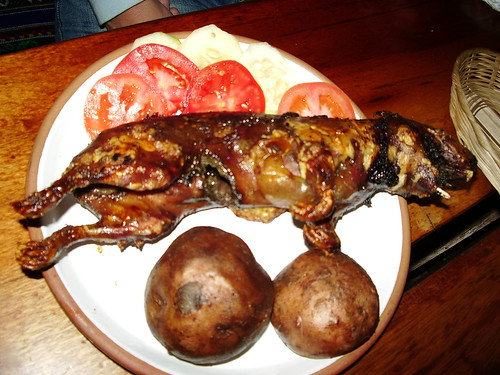 "What's for dinner, mum?" "Fluffy, son."
"What's for dinner, mum?" "Fluffy, son."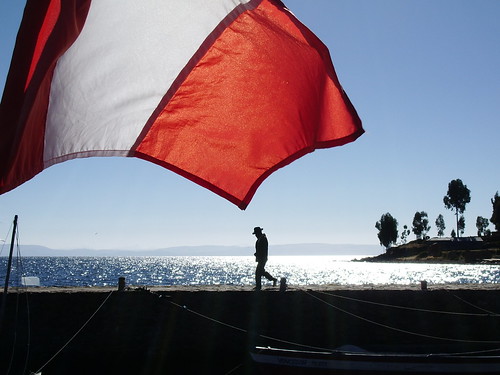 Watch out for the giant flag
Watch out for the giant flag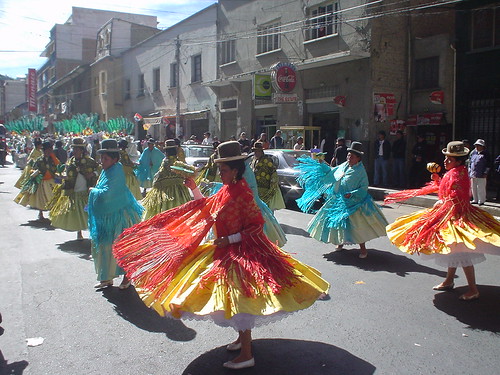 I told you not to wear that to class
I told you not to wear that to class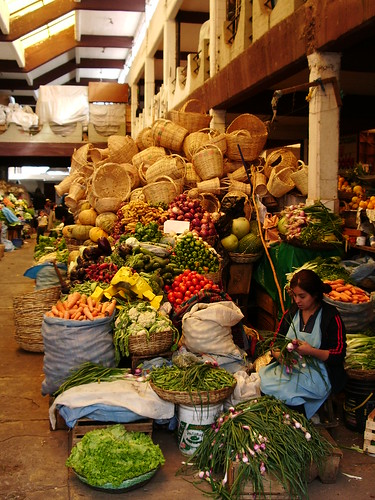
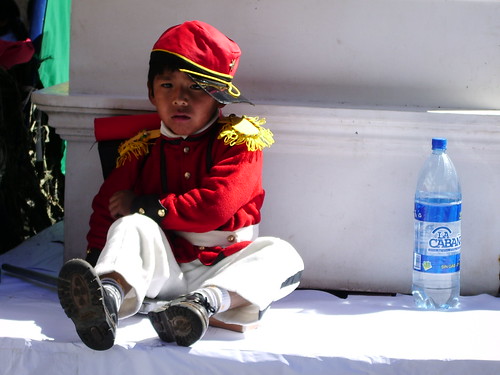 Military enrolement starts early in Bolivia
Military enrolement starts early in Bolivia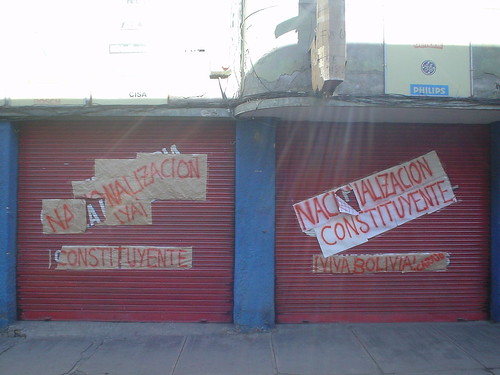 The message is clear
The message is clear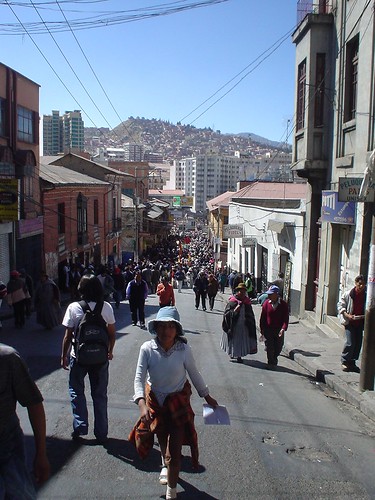
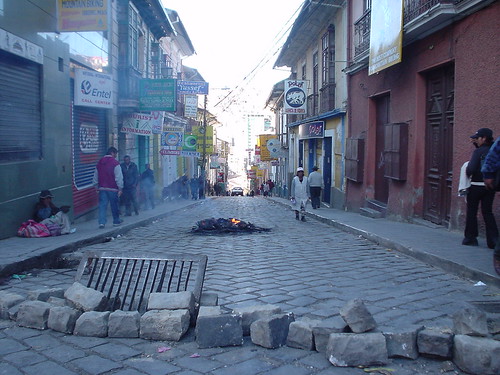 Small blockade on gringo alley
Small blockade on gringo alley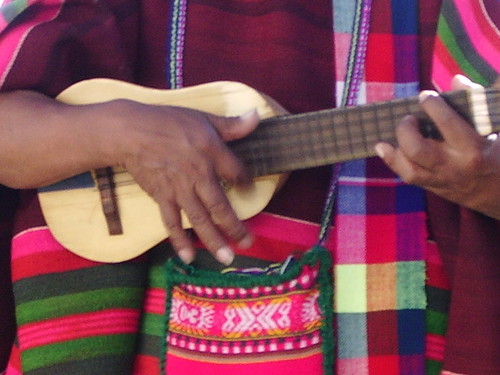 Small guitar, loud clothes
Small guitar, loud clothes